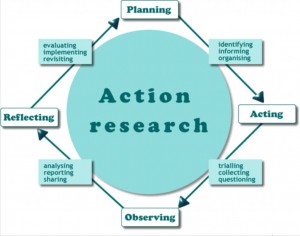Action Research
The Second half of the day focused on The Action Research Method. As a method of research, Action Research focuses “on the conditions and effects of various forms of social action and research leading to social action” and uses “a spiral of steps, each of which is composed of a circle of planning, action and fact-finding about the result of the action”. Experience is an essential part of the action research process. After choosing the topic of focus, and developing questions, the research group must actively engage in the community or situation of question (similar to participant observation). More infomation about the Action research method can be found here and visually in this diagram below. 
Action Research Groups
The cohort was split into 5 smaller groups. Each group was given a specific set of social organizations in Berlin, ranging from Churches,Shelters, NGO’s etc… which deal with issues of migration in different ways. Each group was given a list of different places to explore and then return to the larger group to report on their findings the next day. This excecise gave the groups an opportunity to journey together through the city of the day, gain a some practical exposure to the issues we’ve been discussing, as well as discover the easily accesible affordances of this place. Here’s an overview of places visited by the groups:
Group 1:
Gorki- Museum and Experience Play: Refugee’s Library an exhibit and interactive play which focused on the experience of being a refugee in a fictional country where a language nobody understands is spoken.
Group 2
 Borderline Europe: An Organization which observes humans rights issues on the borders of European union
Borderline Europe: An Organization which observes humans rights issues on the borders of European union
Group 3
Church Asylum: The German Ecumenical Committee on Church Asylum (Ökumenische Bundesarbeitsgemeinschaft Asyl in der Kirche) is a network of associations of German protestant, catholic and free church parishes ready to offer church asylum.
Emergency Refugee Shelter
Group 4
Kubus: An organization which actively supports youth and elderly welfare with a focus on intercultural coexistence of people of different nations and cultures through language education and vocational training
Reach Out: a counselling centre for victims of rightwing extremist, racist or anti-Semitic violence in Berlin.
Group 5
LeGeSo: LEGESO was in the past the State Department of Health and Welfare in Berlin Settled medical book stock was the central point for the German military medical records from both World Wars. Today the offices are completely working in supporting migrants, ensuring all the administrative tasks for their conditions of life, to allow them to live or to work in Germany
MOABIT HILFT: Working with refugees who are often traumatized, speak little or no German language. MOABIT HILFT gathers a group of local residents, institutions, associations and businesses from Moabit to contribute to helping these new residents.
Each group had it’s own experiences (which will be further discussed in the next days blog), but it is safe to say that this research method can be and efficient way to organize a research project, espescially in a short period of time. It is quite beneficial as a group activity considering that it can serve many purposes in a simple structure, allow research questions to be experiences in the context of the local community, as well as facilitate group socialisation and team building. Furthermore, many could imagine using this particular 1-day exercise in Action Research in as good way to introduce research methods for those learning how to do research.

